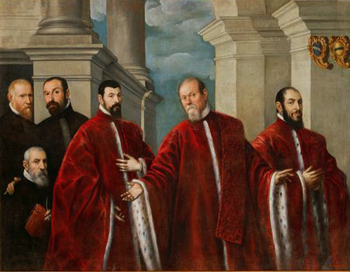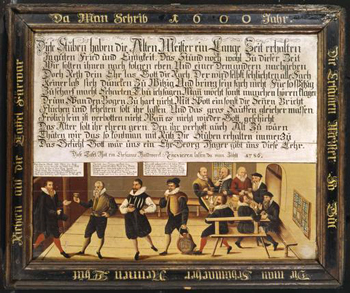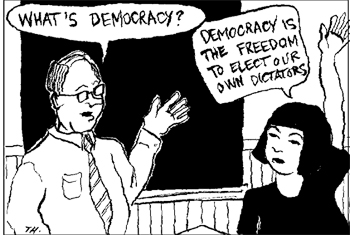Organic Society
 |
 |
 |
 |
 |
 |
 |
Customary Law - IV
Modern Democracy vs. Customary Law
From the 12th century on, the study of Roman Law started to be introduced in the faculties of Law in the universities of Europe. This is not the place to analyze the more profound reasons for that introduction.
With the study of Roman Law, a completely different type of State was presented as ideal: A State that was no longer governed by customs, but rather by laws made by the State itself, which everyone had to obey. The people did not like these artificial laws. Nonetheless, the judges applied them since they deemed Roman Law to be much more sophisticated and academic than those simple laws generated by custom under the warmth of living practice.
 The new laws did much to promote the jurists’ pride. The judge appeared quite erudite before his peers when issuing a sentence based on a text of Papinianus, stressing that
Ulpianus, however, thought in a different way. It was much more beautiful to make such a learned statement than to merely say: “The custom of Innsbruck Forest establishes such-and-such and, therefore, by virtue of that particular regional law, I give this judgment.”
The new laws did much to promote the jurists’ pride. The judge appeared quite erudite before his peers when issuing a sentence based on a text of Papinianus, stressing that
Ulpianus, however, thought in a different way. It was much more beautiful to make such a learned statement than to merely say: “The custom of Innsbruck Forest establishes such-and-such and, therefore, by virtue of that particular regional law, I give this judgment.”
You can imagine the affectation of lawyers born from the new presentation of Roman Law. Our starched Civil Code inherited much of that pretentiousness of Roman Law. Thus, the Roman Law started to be applied in practical judgments.
But, as I noted before, the people did not like it. For example, in France there were violent reactions from the people against its application. In southern France, after many riots, Roman Law gradually entered, but it did not find acceptance in northern France. It was taught in the universities, but the judges did not apply it there. At that time France was divided into two zones: the regions where consuetudinary law – the unwritten law based on custom – was applied, and those where the written law – which was the Roman Law – was in effect.
The curious thing is that the Roman Law also entered as a custom. No medieval King issued a decree putting Roman Law into force. The judges started to apply it because they considered it beautiful and sophisticated. You can see where this type of judiciary affectation has led us.
Essential characteristics of a custom
Thus conceived, a custom can be defined as a usage born spontaneously that has the force of law. A custom does not originate from a sociologist who records statistics and has the last word on a topic. It is born spontaneously, accepted by a whole social group – the interested party. After a time, that custom comes to rule the group. This is a definition of custom.
 Which are the requisites for a custom to exist?
Which are the requisites for a custom to exist?
The first requisite of a custom is that an act must be repeated many times; it must be a long-standing habit. How long did a habit have to exist before it would become a custom? Some scholars established a minimum of at least 40 years, but I believe this is an arbitrary limit. The good customs ruled from time immemorial. It was considered prestigious to be able to say: “Our town has had this custom since time immemorial.”
The second requisite is that a custom must pertain to the public domain. It is evident that if the custom is not public, it cannot rule as law.
Third, a custom is pacific and accepted peacefully by the social group. It could not originate from an act of violence and should be practiced without any serious contestation.
Fourth, the custom is naturally revoked when it falls into disuse.
The false democracy is totalitarian
Today, we hear much talk about democracy. It is understood more or less like this: A party presents me a 50-page booklet with its platform that offers solutions for all the national problems. In it, for example, we find regulations for fishing in the Amazon River, a plan to take advantage of the mineral rights on the borders of Chuí Creek in southern Brazil; laws regulating the importation of petroleum; a proposal to educate the children in the Northeast, etc – 50 pages of solutions.
I make an inquiry to receive the platform of each of the parties – there are 15 parties – and read all this material. After due evaluation I make a decision: This particular party is better. The presupposition of this system is that each citizen understands and knows the solutions for all the questions. So, I choose and give my vote to the party I consider the best. The result of this system is what you can see around us…
 In fact, the solutions should arise in a different way. True democracy is a direct democracy where a man only votes on the questions he understands. The man legislates directly, and not through a representative. This is, actually, what happens when he plays a role in forming a custom and that custom is taken up by the social body. This system is immensely more authentic and more representative of the reality than our modern system.
In fact, the solutions should arise in a different way. True democracy is a direct democracy where a man only votes on the questions he understands. The man legislates directly, and not through a representative. This is, actually, what happens when he plays a role in forming a custom and that custom is taken up by the social body. This system is immensely more authentic and more representative of the reality than our modern system.
Having studied the tremendous elasticity of the customs generated in this way, as we are doing in this series, you can see how stupid it is to affirm that the Middle Ages was a time of tyranny and absolutism, a period where man was a slave.
We have seen the great amount of liberty that the workers and the peasants had in the Middle Ages (here, here, here, here and here), a liberty they would exercise by regulating the customs of their groups in guilds and confraternities. In that society all classes had the amount of liberty they needed to protect themselves, their families and interests.
Then, the Devil came and promised a new “liberty.” The many revolutions he promoted offering “liberty” actually introduced a totalitarian system, which is our modern democracy. It is interesting to compare the two extremes of this process. On one side, we had a society that lived under the organic winds of customary law; on the other side, we have the modern democracy that is increasingly totalitarian where you cannot sneeze without a regulation. If you sneeze without following the rules, you can end in jail.
Why? Because, there is a band of bureaucrats and sociologists that plans the smallest detail in matters regarding the common good. If we do not obey these decrees, we run the risk of being punished. The two extremes are either a totalitarian regime or a society governed by customary law.
This is another confirmation of the maxim, The Devil never gives what he promises. Indeed, since he is the father of lies we can be sure that whatever he promises he will soon take from us.
For example, we have Adam and Eve in Paradise. They were in a perfect situation in the beginning. The Devil entered the picture and promised them that they would be like gods. And what did they get? A terrible diminishment of their intelligences, a weakening of their wills, a rebellion of their sensibilities, and all kinds of decadence – psychological, moral and physical – that came as fruits of original sin.
In the Middle Ages, man had a great deal of harmony and liberty. The Devil entered the scene promising him a revolutionary liberty. And it was exactly this – liberty – that he took from him. Today’s democracies are totalitarian regimes artificially controlled by technocrats, the gurus of the media and bankers, all them serving the ideals of the Revolution.
Continued
With the study of Roman Law, a completely different type of State was presented as ideal: A State that was no longer governed by customs, but rather by laws made by the State itself, which everyone had to obey. The people did not like these artificial laws. Nonetheless, the judges applied them since they deemed Roman Law to be much more sophisticated and academic than those simple laws generated by custom under the warmth of living practice.

Venetian magistrates and notaries assuming majestic airs
You can imagine the affectation of lawyers born from the new presentation of Roman Law. Our starched Civil Code inherited much of that pretentiousness of Roman Law. Thus, the Roman Law started to be applied in practical judgments.
But, as I noted before, the people did not like it. For example, in France there were violent reactions from the people against its application. In southern France, after many riots, Roman Law gradually entered, but it did not find acceptance in northern France. It was taught in the universities, but the judges did not apply it there. At that time France was divided into two zones: the regions where consuetudinary law – the unwritten law based on custom – was applied, and those where the written law – which was the Roman Law – was in effect.
The curious thing is that the Roman Law also entered as a custom. No medieval King issued a decree putting Roman Law into force. The judges started to apply it because they considered it beautiful and sophisticated. You can see where this type of judiciary affectation has led us.
Essential characteristics of a custom
Thus conceived, a custom can be defined as a usage born spontaneously that has the force of law. A custom does not originate from a sociologist who records statistics and has the last word on a topic. It is born spontaneously, accepted by a whole social group – the interested party. After a time, that custom comes to rule the group. This is a definition of custom.

A guild sign for Nuremberg shoemakers, governed by their own customs and law
The first requisite of a custom is that an act must be repeated many times; it must be a long-standing habit. How long did a habit have to exist before it would become a custom? Some scholars established a minimum of at least 40 years, but I believe this is an arbitrary limit. The good customs ruled from time immemorial. It was considered prestigious to be able to say: “Our town has had this custom since time immemorial.”
The second requisite is that a custom must pertain to the public domain. It is evident that if the custom is not public, it cannot rule as law.
Third, a custom is pacific and accepted peacefully by the social group. It could not originate from an act of violence and should be practiced without any serious contestation.
Fourth, the custom is naturally revoked when it falls into disuse.
The false democracy is totalitarian
Today, we hear much talk about democracy. It is understood more or less like this: A party presents me a 50-page booklet with its platform that offers solutions for all the national problems. In it, for example, we find regulations for fishing in the Amazon River, a plan to take advantage of the mineral rights on the borders of Chuí Creek in southern Brazil; laws regulating the importation of petroleum; a proposal to educate the children in the Northeast, etc – 50 pages of solutions.
I make an inquiry to receive the platform of each of the parties – there are 15 parties – and read all this material. After due evaluation I make a decision: This particular party is better. The presupposition of this system is that each citizen understands and knows the solutions for all the questions. So, I choose and give my vote to the party I consider the best. The result of this system is what you can see around us…

Today we see a growing rejection of the false democracies
Having studied the tremendous elasticity of the customs generated in this way, as we are doing in this series, you can see how stupid it is to affirm that the Middle Ages was a time of tyranny and absolutism, a period where man was a slave.
We have seen the great amount of liberty that the workers and the peasants had in the Middle Ages (here, here, here, here and here), a liberty they would exercise by regulating the customs of their groups in guilds and confraternities. In that society all classes had the amount of liberty they needed to protect themselves, their families and interests.
Then, the Devil came and promised a new “liberty.” The many revolutions he promoted offering “liberty” actually introduced a totalitarian system, which is our modern democracy. It is interesting to compare the two extremes of this process. On one side, we had a society that lived under the organic winds of customary law; on the other side, we have the modern democracy that is increasingly totalitarian where you cannot sneeze without a regulation. If you sneeze without following the rules, you can end in jail.
Why? Because, there is a band of bureaucrats and sociologists that plans the smallest detail in matters regarding the common good. If we do not obey these decrees, we run the risk of being punished. The two extremes are either a totalitarian regime or a society governed by customary law.
This is another confirmation of the maxim, The Devil never gives what he promises. Indeed, since he is the father of lies we can be sure that whatever he promises he will soon take from us.
For example, we have Adam and Eve in Paradise. They were in a perfect situation in the beginning. The Devil entered the picture and promised them that they would be like gods. And what did they get? A terrible diminishment of their intelligences, a weakening of their wills, a rebellion of their sensibilities, and all kinds of decadence – psychological, moral and physical – that came as fruits of original sin.
In the Middle Ages, man had a great deal of harmony and liberty. The Devil entered the scene promising him a revolutionary liberty. And it was exactly this – liberty – that he took from him. Today’s democracies are totalitarian regimes artificially controlled by technocrats, the gurus of the media and bankers, all them serving the ideals of the Revolution.
Continued

Posted September 8, 2014
Organic Society was a theme dear to the late Prof. Plinio Corrêa de Oliveira. He addressed this topic on countless occasions during his life - at times in lectures for the formation of his disciples, at times in meetings with friends who gathered to study the social aspects and history of Christendom, at times just in passing.
Prof. Plinio
Atila S. Guimarães selected excerpts of these lectures and conversations from the transcripts of tapes and his own personal notes. He translated and adapted them into articles for the TIA website. In these texts fidelity to the original ideas and words is kept as much as possible.
______________________
______________________












